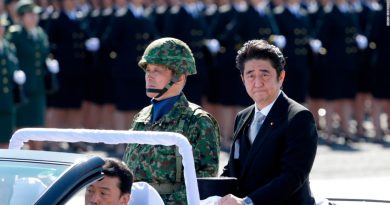Turkey, US near a deal on bases
US officials say the aid package now on the table totals $6 billion in grants and up to $20 billion in loan guarantees. But with the US Army’s Fourth Infantry Division waiting aboard ships off the coast of Turkey, Washington also signaled that it may improve that offer.
Turkish Prime Minister Abdullah Gul told a meeting of business leaders in Istanbul that a US-Turkish agreement was at hand. ”They understand our worries; we understand theirs,” he said. ”A result will be reached in the coming days.”
The head of Turkey’s ruling Justice and Development Party gave lukewarm support to the plans for a US invasion with some 40,000 troops and a massive convoy of armored vehicles and supplies, to be launched from Turkey’s border with Northern Iraq.
”There would be no group decision” on the vote, the news agency Anatolia quoted the leader, Recep Tayyip Erdogan, as saying.
Erdogan said that in a parliamentary vote expected to take place on Tuesday, he hoped ”his friends would act toward the authorization.” The Justice and Development Party holds a majority in the parliament, the Grand National Assembly.
Still, an overwhelming majority of Turks – some polls put the number at 94 percent – oppose a US-led war in Iraq. Many members of Parliament will have difficulty defying their constituents, and the outcome of Tuesday’s vote was uncertain.
Turkish officials have said that a war in Iraq would have a devastating impact on their tourism industry, which brings in about $10 billion a year.
The United States has offered $6 billion and, in an effort to break the deadlock, has suggested that some of that sum could be used to guarantee additional loans beyond the $20 billion the US has offered. Washington has insisted that the loans come through the International Monetary Fund, which links economic reforms to approvals. Turkey wants the US aid to be independent of those conditions.
The Turkish hesitation on the US military plan and the aid package accompanying it has created unexpected tension between the longtime allies. Ankara supported Washington during the 1991 Gulf War.
That war cost Turkey an estimated $30 billion in lost trade and tourism dollars. And many Turks feel that the first President Bush had promised an economic aid package that he never delivered after the 1991 conflict.
That memory has prompted Erdogan to insist that the United States give a written pledge to deliver the aid and that the pledge be signed by President Bush before authorizing the deployment of US troops.
The difficulty in US-Turkish relations coincides with efforts by other US allies to slow the US march toward war and allow more time for United Nations weapons inspections in Iraq.
The United States has openly lobbied the European Union to set a date for talks on whether Turkey will be allowed to join the union. That US support has come despite continuing questions about the state of Turkey’s democracy and the question of human rights violations in a brutal military campaign against a Kurdish separatist movement that has taken 30,000 lives in 15 years of clashes.
But while Turkey relies on such backing, the dispute surrounding preparations for a possible attack on Iraq has raised questions in Turkey.
”The State Department is playing a little bit with Turkey,” said Mehmet Ali Birand, a prominent political commentator. ”They are representing the issue as if it’s only about money and that Turkey is behaving like a Middle East bazaar merchant, but that’s not it. Mainly now what is at issue is the political side of things.”
The political issues that concern Turkey include questions about the role that the ethnic Turkish and Turkmen population will play in northern Iraq after a war. Turkey says they should be given special protections, if not their own autonomous region. Ankara also worries that a push by Iraqi Kurds for an independent state could spark a new separatist movement among its own Kurds.
AnalySts said that those two issues will essentially determine what Iraq will look like after a war and that the two issues are of deep concern to Ankara, especially its powerful military.
”The most important thing is the political future of Iraq and how it will be reshaped by the British, Americans, and Turks,” said Umit Ozdag, an analyst at the Eurasian Center for Strategic Studies in Ankara.



